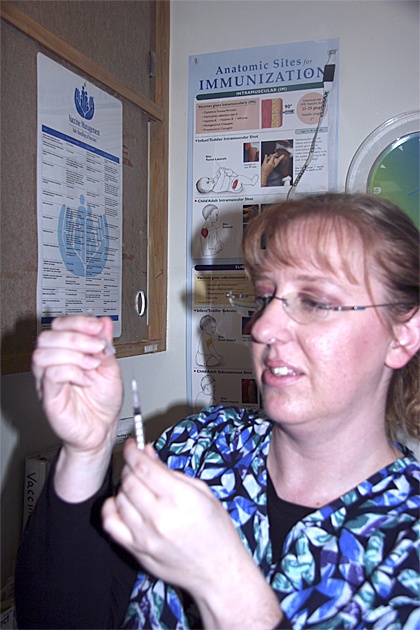Despite delays, supplies of the HlN1, or swine flu, vaccine are reaching hospitals and clinics in the Snoqualmie Valley.
Visits from swine flu patients peaked in the Valley in early November. Local clinics were prepared for the epidemic.
“We enter this season expecting to contend with a large surge, so our expectations have been (for) that,” said Dr. Kimberly Witkop, medical director at Snoqualmie Valley Hospital.
Taking extra precautions, staff at Snoqualmie Valley Hospital and clinics in Snoqualmie and North Bend asked patients with flu symptoms to stay home, or cared for them in dedicated exam rooms to avoid spreading the sickness.
Sherry Moklebust, clinic manager at Snoqualmie Valley Clinic, said her staff does their best to screen patients over the phone.
Although the first wave of swine flu cases appears to be out of the way this fall, that doesn’t mean a second wave isn’t right around the corner.
Noting the flu patterns of the 1918 pandemic, Dr. Gerald Yorioka of the North Bend said there may have also been two waves then.
Before the second wave comes, Moklebust, Witkop and Yorioka ask the community to follow some preventative tips.
Hand washing and hygiene are key factors. Washing your hands before coming home from school or work is a good way to avoid bring the flu home. Staying away from those who are ill, or staying at home if you have flu-like symptoms is best for everyone.
Swine flu is transmitted by droplets in the air through coughing and sneezing. It can also be transmitted on people’s hands. Patients with symptoms should isolate themselves and take responsibility to avoid infecting other people.
Health care providers are pressing to have people immunized as they receive more vaccines.
Yorioka believes a recent decrease in swine flu cases may be from the measures they’ve taken. He hopes to advance the availability of the vaccine past the at-risk patient priority. But this will not be possible until the Centers for Disease Control and Prevention, or CDC, tell him he can immunize those who are beyond the high risk category.
Currently, priority for vaccinations go to pregnant women, caregivers for very young children, healthcare workers with direct contact with patients, children and young adults with chronic medical illnesses — and then everyone else.
Moklebust advises people who have symptoms to call the offices and to come in as needed so they can start an anti-viral medication. Medication is effective in the first 48 hours. Snoqualmie Valley Clinic has seen a big difference in patients who take the medication.
However, the battle is not over, Yorioka said. The hospital and clinics are still encouraging people to get a swine flu and seasonal flu vaccinations, as they expect the flu season to peak again in January.
For more information on vaccinations, visit www.kingcounty.gov/healthservices/health/preparedness/pandemicflu/swineflu.aspx.



